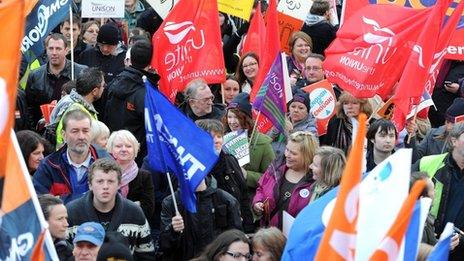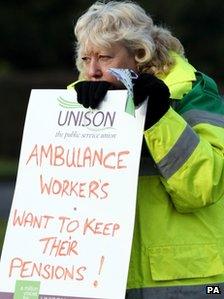Public sector strikes disrupt services across England
- Published

Tens of thousands of people took part in marches and rallies
Strikes by public sector workers, including teachers and health staff, over pension changes have caused widespread disruption across England.
Education Secretary Michael Gove said the action had a "severe impact", with 76% of state-funded schools affected.
The Trades Union Congress (TUC) said the action followed a "triple assault" on public sector pensions.
The government said the cost of public service pensions had risen by a third in a decade, so changes were needed.
Unions object to government plans to make their members pay more and work longer to earn their pensions.
Hundreds of thousands of teachers, civil servants, immigration staff and some NHS workers walked out.
Schools, hospitals, courts, passport offices and ports were among services disrupted, as hundreds of demonstrations were held across the country.
The TUC said more women than ever before had taken part in the strike.
Marching through cities
Calling the strike a "damp squib", David Cameron told the Commons pension changes were "absolutely essential", and the government offer on pensions was fair.
Of the 21,476 state-funded schools in England, 62% were closed and 14% partly shut, the government said.
Val Walker, who had worked in the health service for more than 40 years, said she went out on strike to support her colleagues
Public service workers and supporters marched through towns and cities, including Manchester, Exeter and Nottingham.
Greater Manchester Police said about 20,000 people had taken part in a rally in Manchester city centre, while up to 6,000 people attended a rally in Sheffield city centre and 6,000 people were at a rally in Brighton, police said.
In London, the ambulance service called in police to help respond to 999 calls after a surge in demand after 18:00 GMT.
TUC general secretary Brendan Barber told a rally at Birmingham's National Indoor Arena: "This is an unprecedented day - 30 unions have members taking action together.
"We are sending a crystal clear message to the government that we are strong, that we're united and that our campaign will go on until justice and fairness is delivered for every public servant."
Disruption across England included:
About 400,000 healthcare workers, including nurses and support staff, were on strike, the government estimated
About 60,000 non-urgent operations, out-patient appointments and follow-up appointments were believed to have been postponed
The Torpoint Ferry, one of the main routes linking Devon and Cornwall, closed
Among the locations where the vast majority of schools were closed, Liverpool City Council said 165 of the city's 170 schools were shut
Plane arrivals and take-offs at Heathrow and Gatwick were said to be largely unaffected with only a few cancellations of in-bound transatlantic flights to Heathrow
Scotland Yard said more than 35 protesters in east London were arrested on suspicion of breach of the peace
Just 18 job centres out of more than 900 in the UK closed, according to the Cabinet Office
London Ambulance Service said it was "struggling" and said people not in a life-threatening condition may not get an ambulance, while South East Coast Ambulance Service was only responding to life-threatening emergencies
Mr Barber said: "The brutal truth is simply this - that the living standards of millions of low and medium-paid public service workers are being hammered in the name of reducing the deficit.
"The cuts are beginning to scythe through our public services, more and more jobs are under threat, and as the pay freeze bites - while inflation roars ahead - real wage cuts are making it harder than ever to make ends meet."
Parents around the country were affected as thousands of schools shut, including 85% of schools across London being closed or partially closed, while 80% of the 700 schools in West Yorkshire were affected.
Part-time teacher and NASUWT representative Julia Harris, who protested in Maidstone, Kent, said: "We have to be concerned about the very young, those in their 20s who have just joined, they have mortgages, they want to start families."
Martin McCusker, deputy head teacher of a primary school in Dartford, said the government was "relying on the public sector being a vocation".
But Andy Glide, a parent in West Yorkshire who had to find alternative childcare for his son, had little sympathy for the strikers.
"I think they need to realise that everybody else who's not public sector has gone through a similar sort of thing over the last few years and what they're actually still getting is quite a good deal," he said.

Ambulance staff were among those on strike
At Kettlethorpe High School in Wakefield, one teacher turned around from an NUT picket line after hearing the strikers' views.
Royal Surrey County Hospital in Guildford was among premises with a picket line at the entrance. Unions said about 300 staff were on strike, including nurses, cleaners, catering staff, surgeons and radiographers.
Patients needing urgent treatment in England, such as kidney dialysis, were able to get it and maternity units were open.
Ian McKendrick, a staff nurse picketing outside Warneford hospital in Oxford, said: "I'm looking at a future ending up on benefits because I work in acute admissions and I can't do that job at 66."
Calls to 999 were being answered but patients were urged to call only in emergencies.
London Ambulance Service said 73% of control room staff were working and 58% of crews.
'No queues'
Assistant chief ambulance officer John Pooley said: "We've been having trouble since midnight.
"If you have something that isn't life-threatening the chances are you will not get an ambulance today so please think very seriously before you call us."
Jeremy Cooke flies from Amsterdam to Heathrow without trouble
Lucy Morton, of the Immigration Services Union believed 80-90% of its 4,500 members were on strike. She said as far as they were aware, none of their members had turned up for work at Heathrow.
But at Heathrow, 10 immigration desks for people with EU and UK passports at Terminal 3 were manned by Home Office staff and police officers.
And passenger Tony Smith, who arrived at Heathrow's Terminal 4 on Wednesday morning, said: "The place is empty. No queues. Staff here say it's working better than normal."
Manchester, Luton and Birmingham were among airports reporting little disruption.
On Merseyside, the Mersey Tunnels, used by about 88,000 vehicles a day, closed to the public.
'Every right'
The Local Government Association (LGA) said councils would be "doing everything within their power" to manage disruption and maintain essential "life and limb" services for vulnerable people.
Elsewhere, the Labour leader of Leeds City Council backed workers as they joined the national strike.
Speaking on the picket line at the city's Civic Hall, Keith Wakefield said: "I think they have got every right to show their grievance."
He said the pensions deal was "one of the worst I have ever seen".
Chancellor George Osborne said earlier the strike was "not going to change anything".
"It is only going to make our economy weaker and potentially cost jobs.
"So let's get back round the negotiating table, let's get a pension deal that is fair to the public sector, that gives decent pensions for many, many decades to come but which this country can also afford and our taxpayers can afford.
"That is what we should be doing today, not seeing these strikes."
- Published30 November 2011
- Published1 December 2011
- Published30 November 2011
- Published30 November 2011
- Published30 November 2011
- Published30 November 2011
- Published30 November 2011
- Published30 November 2011
- Published10 May 2012
- Published28 November 2011
- Published10 September 2012